How to Use Essential Oils for Healing
Essential oils are a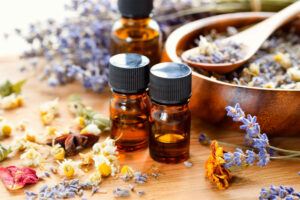 brilliant tool that can be utilized for a wide variety of purposes and uses throughout the healing process. They can also be used to help maintain optimal health.
brilliant tool that can be utilized for a wide variety of purposes and uses throughout the healing process. They can also be used to help maintain optimal health.
Here we will explore what essential oils are, some of their many medicinal uses, herbs and ingredients that are commonly used to make them, how to use essential oils, and some of the most effective medicinal oils that I have found.
Some of the links in this article are affiliate links. This means that if you click the link and subsequently make a purchase on the merchant’s website, we may earn a small commission at absolutely no additional cost to you. All opinions are entirely my own. I have used all products mentioned personally for years.
What Are Essential Oils?
Essential oils are concentrated oils of plant compounds which constitute the “essence” of the plant.
They can be derived from herbs, flowers, fruits, grasses, trees, seeds, roots, bark, bushes, and/or shrubs.
The herbs, flowers, etc for the oils are grown and harvested and then the oils from the plants are extracted via various methods which may include steam distillation, hydro distillation, cold pressing, or absolute extraction.
Distillation and cold pressing render the most pure forms of essential oils.
The oils from the plants are highly concentrated so they are usually added to a carrier oil such as coconut oil which allows the oil to be used topically with more ease.
Administration of Essential Oils
Essential oils can be used topically (applied to the skin to be absorbed by the body), aromatically/inhaled, or ingested.
- Topical
Applying essential oils topically to the skin allows the skin to absorb them into your body’s blood stream. Optimal 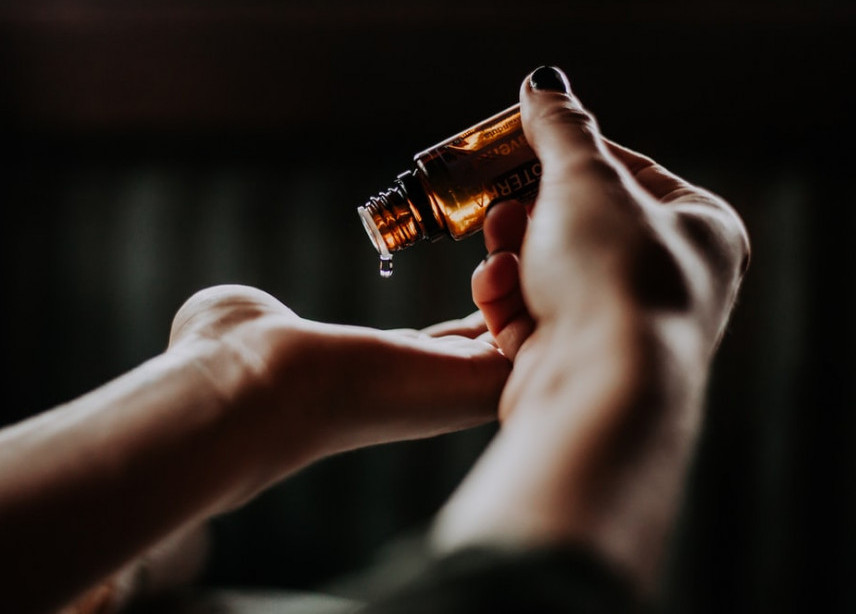 absorption is achieved by massaging the oil into the skin thoroughly.
absorption is achieved by massaging the oil into the skin thoroughly.
The location of administration usually depends on what you are using the essential oil for. Most commonly, topical application is on or near the area of the body that is being treated. For example, to relieve headaches, oils are commonly applied to the temples.
If you have various allergies or sensitives, it is recommended to test a small area of the skin before applying the essential oil.
- Aromatic
The essence of the plant that is found in each oil includes that plant’s distinct aroma. These aromas can be used therapeutically. This is commonly referred to as aromatherapy.
Inhaling the plant’s essence has a notable impact on the limbic system within the brain. This is the part of the brain that has to do with our emotions, long term memory, stress response, heart rate, breathing, and more.
Aromatic use of essential oils is often used to promote relaxation/relieve anxiety, promote sleep/relieve insomnia, relieve headaches, nausea, and much more.
For aromatic use, you can inhale the oil by placing the bottle close to the nose and breathing in and out. In addition, oils can be added to diffusers (discussed further below) or bath water.
- Ingestion
The only time an essential oil should be ingested is if that oil is confirmed to be 100% pure, free of synthetic chemicals, certified organic, food grade, and formulated for consumption. Most essential oils are not made to be ingested, as topical and aromatic use are the most common administration methods.
An example of using an essential oil internally would be food grade peppermint oil. Ingestion of food grade peppermint oil is extremely effective at relieving nausea. It is also a powerful natural antibiotic and can be used to treat oral infections and improve oral health.
Ingestion usually involves placing a number of drops of the oil in water or liquid and drinking.
Additional Uses
While essential oils are an excellent medicinal/therapeutic tool, they can also be used in other ways including as a:
- Natural air freshener
- Natural laundry freshener
- Natural perfume
One of the best ways to use them as a natural air fresher is by using a cold air diffuser, which diffuses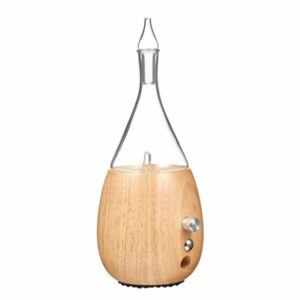 the oil into the air as an ultra fine and dry mist. These are also called nebulizing diffusers. I have used this one for years and I love it.
the oil into the air as an ultra fine and dry mist. These are also called nebulizing diffusers. I have used this one for years and I love it.
I diffuse peppermint oil most often, as it really helps to improve breathing by opening the airways and it smells wonderful.
Cold air diffusers are more effective at distributing the oil throughout the air in the room than water diffusers.
Using a diffuser is also a good way of utilizing the aromatheraputic benefits of each oil.
To use essential oils as a laundry freshener, the oil can be added to the water used for washing. You can also drop a few drops of your favorite oil onto a cotton ball and place it in the dryer with your laundry. Antibacterial oils such as clove, peppermint, and lavender are particularly effective at freshening fabrics.
To use essential oils as a natural perfume, you can drop 1 or 2 drops on your inner wrists and rub them together, and also rub 1 or 2 drops onto your neck.
The Many Medicinal Uses of Essential Oils
Essential oils are excellent facilitators of the human body’s innate ability to heal itself, as they provide gentle yet powerful support for an exceptionally wide variety of physiological functions within the body.
Essential oils can be used to support basically every facet of healing. This includes:
- supporting digestion
- supporting adrenal health
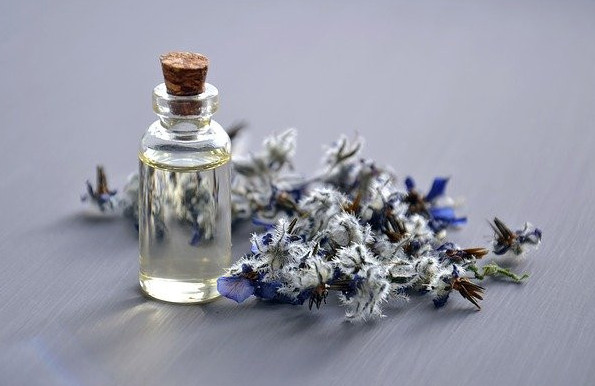
- supporting immune health
- reducing inflammation
- improving brain function
- supporting the liver
- supporting the gut and intestines
- improving sleep quality
- supporting respiratory function
- supporting cardiovascular function
- supporting overall hormone balance
- supporting blood sugar balance
- balancing the stress response and promoting relaxation
- supporting detoxification
- and more
Common Herbs and Ingredients Used for Essential Oils
Some of the most commonly used herbs and ingredients used to make essential oils + some of their main health benefits include:
- Lavender –
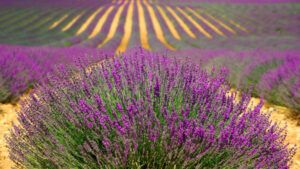 burn healing, relaxation/stress response support/natural anxiety relief, promotion of sleep/relieves insomnia, reduces blood pressure, respiratory support, antifungal, antibacterial, antiviral, anti-inflammatory, elevates mood, relieves headaches, and more
burn healing, relaxation/stress response support/natural anxiety relief, promotion of sleep/relieves insomnia, reduces blood pressure, respiratory support, antifungal, antibacterial, antiviral, anti-inflammatory, elevates mood, relieves headaches, and more
- Peppermint – respiratory support/bronchodilation, decongestant, improves energy levels, relieves nausea, improves digestion, relieves headaches, antibacterial, and more
- Bergamont – antibacterial, anti-inflammatory, relaxation/stress response support/natural anxiety relief, lowers cholesterol, expedites wound healing, elevates mood, and more
- Lime – improves energy levels, improves clarity of thought, improves focus, antibacterial, antiviral, elevates mood, relaxation/stress response support/natural anxiety relief, and more
- Clove – antibacterial, immune supporting, respiratory support/bronchodilation, digestive support, supports oral health, and more
- Cardamom – relieves nausea, supports digestion, antibacterial, lowers blood pressure, anti-inflammatory, supports digestion, soothes peptic ulcers, respiratory support, blood sugar balancing, liver supporting, and more
- Thyme – antifungal, antibacterial, immune supporting, anti-inflammatory, improves circulation, skincare, reduces spasms, supports digestion, supports heart health, supports detoxification, improves energy levels, elevates mood, and more
- Rosemary – reduces hair loss/stimulates hair growth, improves brain function, pain relieving, improves circulation, relaxation/stress response support/natural anxiety relief, relieves headaches, anti-inflammatory, elevates mood, and more
- Cinnamon – blood sugar balancing, improves brain function, blood cleansing, pain relieving, improves circulation, antibacterial, antifungal, antiviral, supports digestion, insect repellent, and more
- Chamomile – relaxation/stress response support/natural anxiety relief, improves sleep quality/relieves insomnia, improves digestion, relieves nausea, skincare, anti-inflammatory, expedites wound healing, and more
- Frankincense – anti-inflammatory, respiratory support, supports gut health, supports tissue repair and wound healing, supports oral health, antibacterial, immune supporting, improves memory, supports digestion, improves sleep quality, improves energy levels, and more
- Ylang Ylang – lowers blood pressure, elevates mood, relaxation/stress response support/natural anxiety relief, skincare,
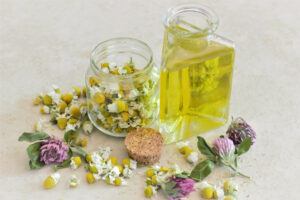 insect repellent, anti-inflammatory, supports wound healing, and more
insect repellent, anti-inflammatory, supports wound healing, and more
- Helichrysm – supports would healing, anti-inflammatory, supports digestion, immune supporting, reduces cough, skincare, liver supporting, antifungal, and more
- Jasmine – elevates mood, improves sleep quality/relieves insomnia, antibacterial, antifungal, skincare, supports lactation, and more
- Tarragon – improves circulation, anti-inflammatory, antioxidant, balances blood sugar/improves insulin sensitivity, improves sleep quality, supports heart health, antibacterial, and more
Vibrant Blue Oils
Hands down, the very best line of therapeutic grade medicinal essential oils that I have used is Vibrant Blue Oils based in Seattle, Washington.
I have been using them for several years and the noticeable efficacy of these oils has been really impressive in many ways, more so than any other line that I have tried.
I absolutely love these oils and they will always be a part of my healing and health maintenance protocol.
This line of oils consists of a plethora of single ingredient and therapeutic blends that are intended for topical or aromatic use.
Vibrant Blue Oils are organic, pure, and therapeutic grade and are free from chemical fertilizers, pesticides, and added synthetic chemicals. Most are extracted using steam distillation and are sourced from small farms around the world.
While these oils are 100% pure, therapeutic food grade oils, they are not meant to be ingested.
The following are a few of my absolute favorites that I have used a great deal and have found to be very effective:
1) Adrenal Blend
This is an oil that is designed to support the adrenal glands comprehensively. The adrenal glands are small triangular shaped glands that sit on top of each kidney. They are an important part of your endocrine system, and are responsible for producing hormones (“chemical messengers”) that regulate many physiological functions such as blood pressure, stress response, metabolism, and immune function, among others.
The adrenal glands play a big role in the stress response, as they produce the stress hormones cortisol, adrenaline, and noradrenaline.
The Adrenal oil can help both overactive adrenal function such as excessive stress hormone production and it can also help an underactive adrenal state where hormone production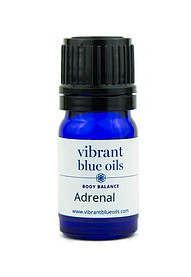 is depleted.
is depleted.
It is a blend of cinnamon, galbanum, manuka, rosemary, and thyme in a base of fractionated coconut oil.
Administration: apply 1-2 drops directly over the adrenal glands and massage into the skin thoroughly, 1 to 2 times per day. The adrenal glands are located on the lower mid back and the upper middle abdomen below the ribs.
It can also be used aromatically by holding the bottle close to the nose for 3 to 4 full breaths in and out.
Several of the conditions I have had including copper imbalance, Biotoxin Illness/Mold Toxicity, and gut infections can have a very intense impact on the adrenal glands, as they catalyze a state of stress within the body. Due to this, the adrenal glands overproduce stress hormones such as cortisol, leading to extreme exhaustion and hormone imbalance, among other effects.
As a result of this, I began to feel a tingling, slight burning sensation on my adrenal glands.
After several months of this sensation, I purchased Adrenal and applied the oil over my adrenal glands on the front and back of my abdomen.
The very first day that I applied the Adrenal oil, the sensation completely ceased. It was absolutely amazing and one of the most impressive and quick effects I’ve experienced from a product throughout my lengthy and involved healing journey.
This oil can be used to specifically support the adrenal glands and/or as a tool for general stress response support.
Click here to check out the Adrenal oil.
⭐️You may use code WELCOME10 at checkout for $10 off your first order :)⭐️
2) Parasympathetic Blend
Our nervous system consists of the central and peripheral nervous systems. The peripheral nervous system is then made up of the somatic and autonomic nervous systems. The autonomic nervous system then consists of 3 parts: the sympathetic nervous system, the parasympathetic nervous system, and the enteric nervous system.
The sympathetic nervous system involves the “fight or flight” stress response and the parasympathetic nervous system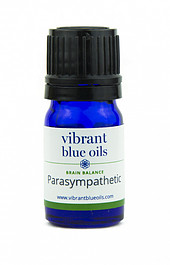 involves the “rest and digest” state of being. It is in the parasympathetic state that the body is best able to heal, digest and assimilate nutrients, and function optimally overall.
involves the “rest and digest” state of being. It is in the parasympathetic state that the body is best able to heal, digest and assimilate nutrients, and function optimally overall.
The Parasympathetic blend is a simple combination of lime and clove bud in a base of fractionated coconut oil.
Administration: 1-3 drops massaged into the skin on the vagus nerve, behind the ears on the mastoid bone, 1 to 3 times per day. It can also be used aromatically by holding the bottle close to the nose and breathing in and out 3 to 4 times.
This oil is a wonderful way to support oneself during times of increased stress, as well as a tool for overall stress response support. It can also be used to promote relaxation and improve digestion, as we digest our food best when in the parasympathetic state.
Parasympathetic can also help to improve focus, energy levels, and elevate mood. It’s a great “all around” oil and also great to start with if you are new to using essential oils for healing.
Most forms of chronic illness are a form of trauma or stress on the body, and can trigger the “fight or flight” autonomic nervous system state. Utilizing a gentle yet powerfully effective agent like the Parasympathetic oil is a helpful way to support the body’s healing process and help to move the body out of the detrimental “fight or flight” state.
After using the Parasympathetic oil for about 2 weeks, I noticed that it helped to promote relaxation, improved my sleep quality, and reduced brain fog. It has also helped to improve my energy levels and stamina throughout the day.
As mentioned above, a number of the health conditions that I have had notably catalyze a state of stress within the body, and this oil has been helpful in balancing this response, especially when used alongside the Adrenal oil.
I keep a bottle of this oil in my purse at all times. It smells delightful, as it has a refreshing, uplifting scent and really opens the airways when used aromatically as well.
Click here to check out the Parasympathetic oil.
⭐️You may use code WELCOME10 at checkout for $10 off your first order :)⭐️
3) Anti-Inflammatory Blend
Inflammation is an immune response that is needed to temporarily heal wounds, fight infection, and more. However, imbalances and illness can arise when inflammation becomes chronic, which is very common.
Chronic inflammation can cause symptoms such as chronic pain, arthritis, headaches/migraines, hormone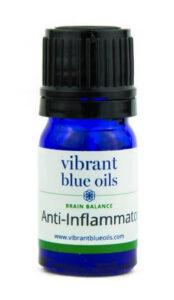 imbalances, brain fog, chronic fatigue, weight fluctuations, asthma, and much more.
imbalances, brain fog, chronic fatigue, weight fluctuations, asthma, and much more.
The Anti-Inflammatory oil is a blend of frankincense, dill, grapefruit, cucumber, tarragon, ylang ylang, and ginger. Each of these ingredients houses powerful anti-inflammatory properties that are helpful for calming and reducing inflammation throughout the body.
Administration: 2-3 drops over any inflamed area of the body, 2 to 3 times per day. For example, this oil can be administered to the back of the skull/upper neck or on the temples for headaches, or to any area where pain and inflammation is present such as over the joints, on the chest, neck, etc. It can be used anywhere on the body.
It can also be used aromatically by holding the bottle close to the nose and breathing in and out 3 to 4 times.
This oil is very helpful for endometriosis and relieving associated pain, explained much further here. To help relieve endometriosis pain, I apply 2 to 3 drops over my abdomen and massage the oil into the skin thoroughly.
After using the oil for a few days I noticed a reduction in abdominal pain which has continued to improve with my continued use of the oil.
I also apply it to my temples to relieve headaches and its a big help.
I also use this on my chest and throat to help open my airways and improve my breathing overall. I can tell a difference shortly after applying it, as I have less chest tightness and can breathe easier.
Click here to check out the Anti-Inflammatory oil.
⭐️You may use code WELCOME10 at checkout for $10 off your first order :)⭐️
Further Education and Additional Resources
The owner of Vibrant Blue Oils, Jodi Cohen, also has an excellent book called Essential Oils to Boost the Brain & Heal the Body, that is a wonderful resource to learn more about essential oils and their many uses for healing.
Vibrant Blue Oils also offers online classes that can help to teach you all about how essential oils can be used for healing.
One such class is the Reboot the Brain with Essential Oils class.
The health of our brain is absolutely imperative to the health of the rest of our body, as the brain essentially acts as a control center for our bodies.
This class is an 8-week online class that will teach you all about how brain health is so instrumental to overall health, and how essential oils can play a key role in addressing imbalances in this area.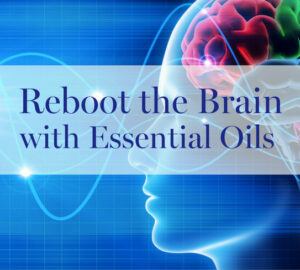
You’ll learn all about:
- The nervous systems
- The influence of stress on our immune system
- Detoxification
- Inflammation
- Strategies for healing
- Much more
Click here to check it out.
In Closing…
As we’ve explored here, essential oils are a dynamic resource that have a wide variety of uses. They are also an effective tool to incorporate into most healing protocols, as they offer a range of supportive benefits that are appropriate for an array of healing needs.
They are gentle yet powerful and are a wonderful example of the healing power of nature.
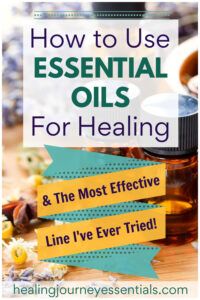
REFERENCES
Essential oils, also known as volatile or essential oils, are natural ingredients in aromatic plants. They contain easily volatile molecules that give a specific smell and taste to aromatic plants. Essential oils have many therapeutic properties. Essential oils are produced in specialized glandular structures of aromatic plants. Their amount is usually not the same in all parts of the plant. Thus, for example. cumin or anise seeds are much richer in essential oil than other parts of the plant. In mint, the largest amount of essential oil is in the leaves, and in lavender in the flower.
Hi Bojana! Thank you for your comment :). Indeed, the essential oils are extracted from various parts of the plant depending on where the oils are most concentrated in that plant. It’s super cool what an abundance of plants, herbs, shrubs, etc there are that can provide these oils for our use. All the best to you!
Hmm, this was interesting, as I didn’t think that there was any circumstance when an essential oil should be ingested! I’m not sure I’ve ever noticed any labeled as “food grade”, so is that because it’s not very common?
My favorite uses for essential oils are for aromatherapy. I have found that orange and citrus can help with fatigue and that lavender can help produce a calming effect. Thanks for the additional suggestions of some interesting types to try in the future!
Hi Aly! Thank you for your comment :). You are most welcome!
Most essential oils are not meant to be ingested, only used for aromatic or topical use. All of the oils included in this article are only intended for topical use.
However, peppermint is the most commonly used essential oil with ingestion as an administration method. For example, I have used this tincture which contains peppermint essential oil for years to help with nausea and for digestive support. It is a great help.
Herb Pharm uses certified organic ingredients that are intended for consumption. The tinctures are combined with water when consumed.
Unless a product is certified organic, pure, food grade, and made for consumption, then it should not be ingested.
I love using orange, citrus/lemon oil, and lavender for aromatherapy in my diffuser as well :).
All the best to you!
I have used essential oils before, like lavender, to calm my nerves when in a stress situation, but I didn’t know that there were so many other ways that they are helpful. Like the ingestion of essential oils, isn’t that dangerous if you don’t know what you’re doing? Should I look for a professional maybe? thanks
Hi Lizzy! Thank you for your comment :).
Most essential oils are only meant to be used topically or aromatically. Peppermint is the most commonly used plant that provides essential oils that can be used for consumption. I have used this tincture for years to relieve nausea and to support digestive health, which contains peppermint essential oil. Herb Pharm uses only certified organic ingredients and their tinctures are made for consumption.
The only time it is appropriate to ingest an essential oil is if it is certified organic, pure, food grade, and made for consumption, which should all be clearly provided by the company making the product. While peppermint is indeed one of the most commonly used oils for consumption, there are still lots of peppermint essential oil products that are available that should only be used aromatically or topically, as they are not made and formulated for ingestion.
A natural health practitioner will be able to help you decide which oils would be best suited for you indeed :).
I’ve used lavender for stress support as well, its a great tool to have!
Thanks and I wish you all the best in your journey!